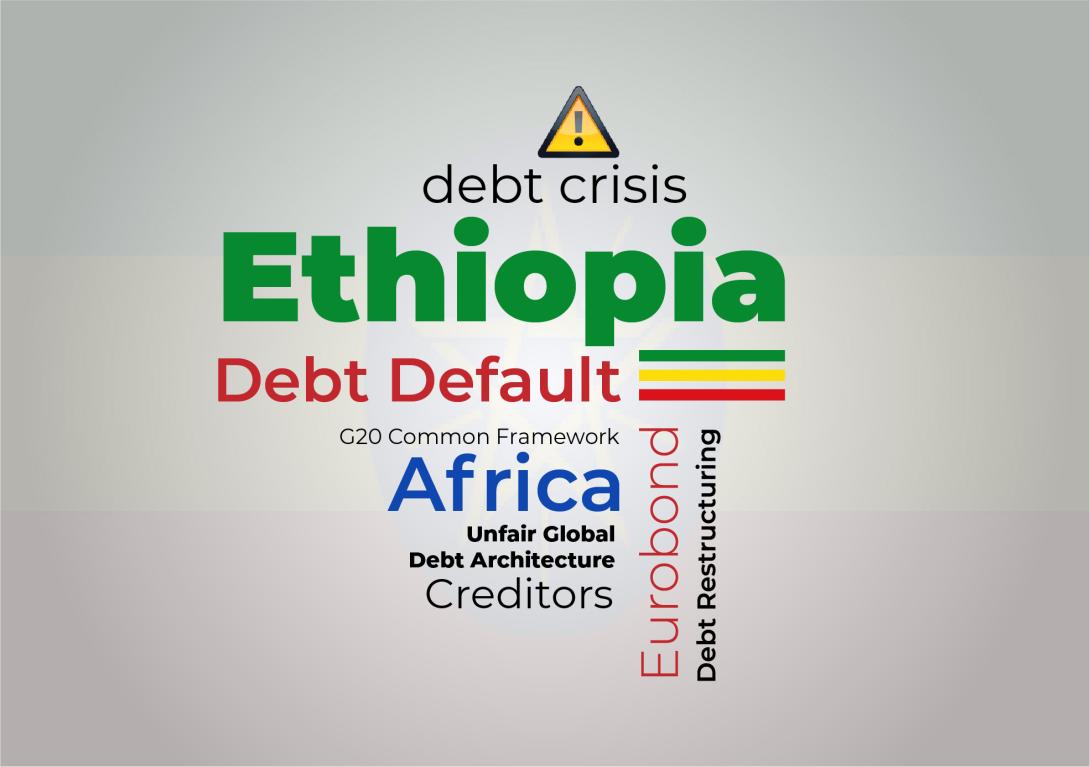
Ethiopia has been contending with economic pressures following the COVID-19 pandemic and a devastating conflict in the Northern Tigray region that have caused immense inflationary pressure, foreign currency shortages, and growing debt burdens.
A recent national debt meeting convened by AFRODAD and the Horn of Economic and Social Policy Institute (HESPI) on July 18th, 2024, laid bare the grim reality of Ethiopia’s debt crisis. According to a working paper[1] by HESPI on the country’s public debt and macroeconomic nexus, Ethiopia runs structural current-account deficits, and its external imbalances have also worsened in the past four years amid multiple shocks (both external and internal) and disrupted external financing inflows. Additionally, even with the Government of Ethiopia's deliberate uptake of concessional borrowing, it was flagged at risk of external debt distress since 2017, because of increased borrowing to finance infrastructure and social investments amidst weak export performance. As of 2023, nearly 50% of the country’s external debt is in transport and energy alone. The country’s outstanding debt stands at USD 25,828.39 million out of which USD 28,389.39 million constitutes its external debt (43.1%) while USD 37,439million (56.9%) is made up of its domestic debt[2]. A significant amount of its debt is concessional held by multilateral lenders about USD 15,107.27million (54.4%), USD 7,589.56 million (27.4%) by bilateral lenders, and USD 5,053.62 million (18.2%) by private creditors.
The situation reached a tipping point when the country defaulted on its international bond, becoming the third African country to do so after missing an interest payment of $ 33 million in December 2023. This event underscored the gravity of the crisis and prompted the government to seek debt relief under the G20 Common Framework. While carrying out program discussions with the International Monetary Fund, the country reached an agreement with its official bilateral creditors in November 2023 for interim debt service and began talks to restructure its $1 billion Eurobond. It successfully reached a two-year debt suspension agreement for the fiscal year 2023/2024 until July 2024 with China, its largest creditor, providing the country with much-needed relief. AFRODAD, in the stakeholder meeting, however, pointed out that while the G20 Common Framework favours a case-by-case approach and strong creditors' coordination in addressing debt vulnerabilities of debt-distressed countries, under the principles of solidarity, consensus, information sharing, conditionality (IMF Program) and comparability of treatment, this has not been the experience for Ethiopia.
It has instead endured high-interest debt repayments despite seeking relief at the expense of public sector spending arising from a lack of clarity concerning procedures, and poor creditor coordination even while creditors such as China, which is the co-chair of Ethiopia’s official creditor committee in the G20 Common Framework urged other creditors to agree to terms like theirs. AFRODAD further cautioned, given Zambia’s and Chad’s experience, the consistent holdout of creditors and the International Monetary Fund (IMF) prioritising creditor interests might be the only thing Common about the Common Framework. Indeed, Paris Club creditors are now likely to effect debt suspension for the rest of 2024, fulfilling their condition for debt relief under the Framework to Ethiopia, as the IMF Board has now just approved a USD 3.4 billion loan under its Extended Credit Facility, as a condition for it to effect debt relief. The four-year financing package is meant to address Ethiopia’s “macroeconomic balances, restore external debt sustainability, and lay the foundations for higher, inclusive, and private sector-led growth.” Since the approval, however, Ethiopia’s currency lost 30% of its value soon after announcing the switch from a fixed exchange rate to a free float exchange rate regime, as one of the key policy recommendations under the IMF-backed program.
A fixed exchange rate regime is a common policy conditionality by the IMF under the guise of financial liberalisation. Currency devaluation is often one of IMF’s prerequisites before availing bailout prescribed as a solution to fix a country’s external imbalances and relieve FX shortages. However, for a country with a significant amount of foreign-denominated debt, devaluation will mean that Ethiopia’s USD denominated debt will become more expensive due to loss of Birr value and increase its debt servicing costs which will further impact its fiscal policy. Furthermore, devaluation often increases a country's excessive reliance on imported commodities, generates a major outflow of money (capital flight), and leaves a country unable to recover exploited monies, while making the economy weak and unstable. Sadly, 80 years on, the IMF is still continuing to fix countries like Ethiopia in perpetual debt cycle in the guise of debt relief which depicts the paradox of debt relief and multilateral lending and the reality of a failed global debt architecture.
While the National Debt meeting recognised that much is being done at the national level to manage its debt including the existence of an adequate legal and institutional framework governing Ethiopia’s acquisition of and management of sovereign debt, Ethiopia requires more than just debt relief. The country needs a comprehensive approach that addresses the root causes of the crisis, including the need for increased investment in productive sectors, fair trade practices, and support for local economies. Additionally, there is an urgent need for a fundamental overhaul of the global financial architecture to ensure that the interests of developing countries are prioritised.
---
[1] Pending publication
[2] Ministry of Finance Ethiopia Public Sector Debt Stastistical Bulletin 30 June 2024: https://www.mofed.gov.et/media/filer_public/6e/2d/6e2d989e-bee1-4f11-ade1-46813f9aae2d/public_sector_debt_statistical_bulletin_no_49.pdf
By Catherine Mithia
